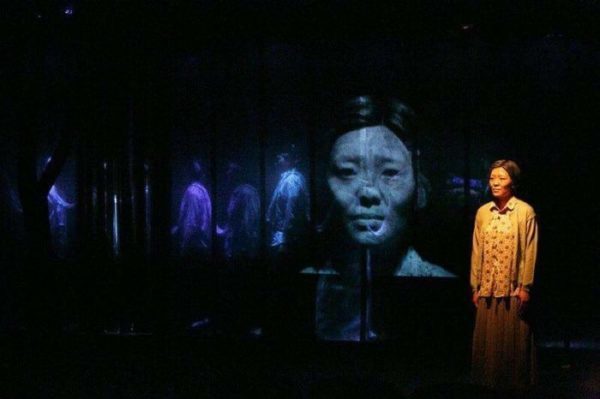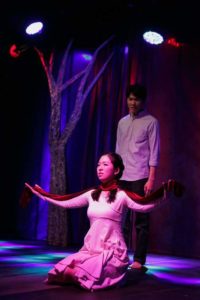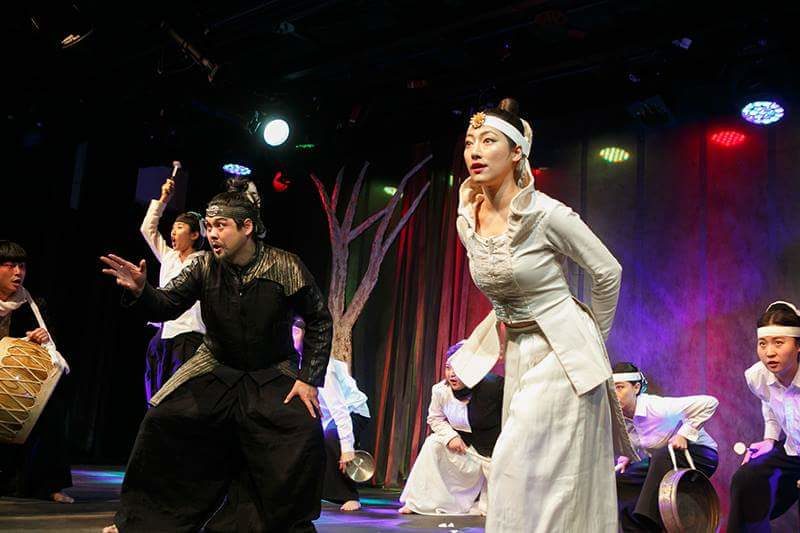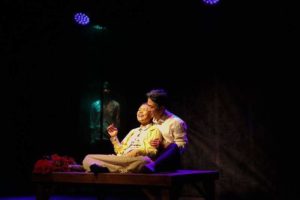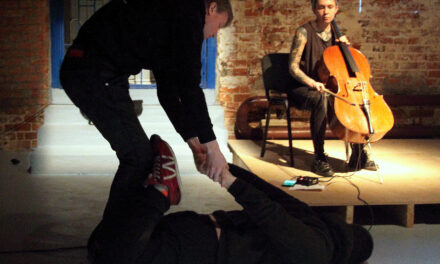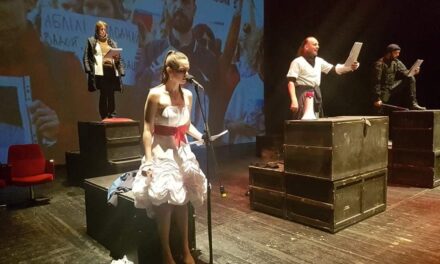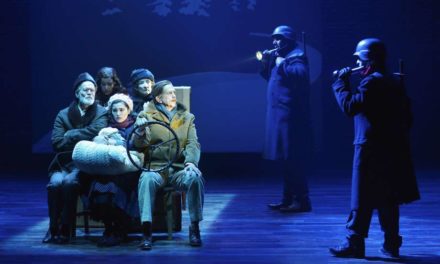Theatre Company Gorae’s Red Poem, written and directed by company founder Lee Hae-Sung, recently completed its fourth run since its stunning premiere in 2011. It will immediately transfer to a temporary performance space erected in Gwanghwamun Square, Seoul for a special one-week run. (I will return to this unusual situation at the end.) Performances were in high demand even after five years; I barely got in on a sold-out weeknight during the holiday season after being on the waiting list. Guerilla Theater’s tiny black box, which barely seats a hundred, was literally packed wall to wall. I had to sit on a cushion on the edge of the stage, within arms-length of some of the actors during the performance.
Yet the pre-curtain audience was strangely somber. Despite its evident popularity, Red Poem isn’t exactly what you would call a crowd-pleaser. Most audiences would have already known by word of mouth that the play deals with painful social issues, all the more uncomfortable because these problems have merely faded from the media and public attention without being resolved. Fully aware that the play will likely be depressing and infuriating, people still fill the theatre every night with a grave sense of responsibility.
The play focuses on two house-ridden characters: Dongjoo (Hong Cheol-Hee), a young reporter working at a major newspaper, and his infirm grandmother (Kang Ae-Shim, who won Best Female Actor at the 2014 Korean Theatre Awards). Dongjoo has stopped going to work for a month. A silent young woman, a ghost that only he can see, follows him around the yard, provoking his abrasive paranoia. We later find out that Dongjoo accompanied his bosses to a private lounge in an acting agency, where aspiring celebrities were forced to attend to them sexually. One of the young women, the mysterious figure who haunts the stage, committed suicide afterwards, throwing Dongjoo into self-imposed isolation.
It turns out that the woman was coerced into sexual service on the anniversary of her mother’s death. With this minute detail, Red Poem directly evokes an actual incident—the suicide of actress Jang Ja-Yeon in 2009. Her death would have gone unnoticed, just another victim of Korea’s media underworld that everyone knows but doesn’t want to talk about, except that Jang left behind notes and letters listing the men she had to serve. Her posthumous writings, dubbed the “Jang Ja-Yeon List,” included the names of high-ranking businessmen, TV producers, film directors, and, most explosively, the CEO of Chosun Ilbo, one of the most powerful media outlets in Korea with deep connections to the social elite reaching back to the Japanese colonial period. Needless to say, the list was viciously discredited in the news, and none of the accused men were punished. Conservative media and state power worked together to turn Jang’s dying words into lies. In the play, a manager from Dongjoo’s newspaper visits to check on him, projecting the air of a mid-level mobster.
Meanwhile, Grandma suffers from dementia, rambling nonsensically and even soiling herself in one scene. But Korean audiences can easily piece together her tragic past when she keeps asking what day of the week it is, supposedly having somewhere important to go on Wednesday. The surviving women of the Japanese military’s sex slavery operations around World War II, known as the “comfort women,” have gathered in front of the Japanese embassy in Seoul every Wednesday since 1992 to demand a formal confession and apology from the Japanese government. It is revealed that Grandma was taken to one of these comfort women camps in Manchuria as a young girl. She kept this history a secret even to her own son, fabricating a romanticized story about his missing father. The handsome, Tokyo-educated man who wore blindingly clean white shirts in her narrative was actually one of the countless Japanese soldiers who had raped and tortured her before she managed to escape. Ironically, as Grandma’s ailing mind gradually pushes her away from reality, the truth pushes back and reveals itself to her children and grandchildren.
Grandma’s painful memories and the ghostly woman’s anguish begin to resurface after a messenger from the afterlife mistakes Dongjoo for Grandma and brings him before Okhwang-sangje and Yeomla-daewang, the gods of Life and Death, Beginning and End in Korean folklore. The two gods offer to send Dongjoo back, but he refuses, preferring the numbness of a limbo over the agony of living in a repulsive world. Admittedly, the afterlife sequence is the weakest part of the play. Dongjoo’s Expressionistic journey through the lives of the two suffering women feels embarrassingly outdated. Besides, his realizations aren’t all that interesting since the audience figures things out far before he does. Equally clichéd is the use of traditional masks and instruments in the song-and-dance interludes, a perfunctory nod to the madang-guk movement that led Korean political theatre in the 1980s.
However, these awkward elements abruptly vanish in the play’s most powerful scene. Grandma stands alone on the bare stage, a close-up of her face projected onto the back wall via a live feed. In the dramatic fiction, we are seeing Grandma through the perspective of Dongjoo’s spirit (who is faintly visible behind a scrim), but none of that matters once she begins her long monologue. This fifteen-minute scene could have been the entire piece. With searing clarity, she tells the story of her kidnapping and the atrocities she suffered in captivity, part of which I have translated below:
“I was red and swollen and bleeding down there but the soldiers kept coming. Sometimes thirty in a day, sometimes forty. They were so cruel because they weren’t sure when one of us would die. They burned us down there and our breasts and our tongues. They carved their names on our backs with knives. I didn’t exist. I was trapped in this body and couldn’t run. The world would spin and spin. We lived like animals. One day Boksun got pregnant. She knew they got rid of the pregnant ones so Boksun tried to run away. But she was caught immediately. They stripped her naked and hung her upside-down on a tree. The next day we had to watch them cut her belly open with a Japanese sword and take the fetus out. They severed the cord and draped it around our necks. Then they cut off Boksun’s head. They boiled Boksun’s head in a pot and made us drink the water. I lost my mind.”
The gruesome, unthinkable details of Grandma’s narrative are taken directly from the testimonies of several North Korean comfort women survivors who were filmed in the late 1990s by a Japanese photojournalist, the scars and smudgy traces of forced tattoos still visible on their bodies over sixty years later. Yes, this is a play. An actress is playing a role forty years older than her. And yet, the words are real. Towards the end of the play, Grandma delivers another wild monologue that shatters the dramatic barrier, this time reciting the names of comfort women survivors who are still alive, all in their 80s and 90s, still waiting for an apology.
In the end, Red Poem’s clichés and clunky structure don’t diminish this play’s importance to Koreans right now. Lee wants us to refamiliarize ourselves with harrowing accounts that society urges us to forget. Had they always been so coarse and disturbing? It is significant that the play pairs two, equally emotionally taxing incidents of women being sexually violated by men in power. Rather than solicit sympathy for the few victims whose stories have made it onto the media, Red Poem reminds us that these are only two strands in a broader historical fabric that we must see in its entirety.
Red Poem challenges its audience to look and listen harder. After Dongjoo miraculously returns to life and Grandma passes away into death (none of which is really explained in the plot), the play ends in a complete non-sequitur. The actress who had convincingly played Grandma appears in full makeup and a curly red wig, swinging her body playfully as she sings a ridiculously outdated pop song. Why the off-putting schmaltz all of a sudden? Why dissolve the tragic tone that the production worked so hard to establish?
My answer is that the play intentionally leaves us unconvinced. It asks us to resist the allure of emotional closure, the relief of oblivion. It reminds us that even though Jang Ja-Yeon and the Wednesday protests no longer make the news, these wounds are still open. (Actually, at the time of this writing, the comfort women issue is making headlines again thanks to the effort of support groups.) As much as the conservative media tries to muddy the issue and discredit the victims, many recognize that these problems haven’t gone away. And so people flock to hear the stories again.
There is much more to say about Red Poem and its creators. A few days ago, Lee and an eclectic group of artists and labor activists erected a large black tent in Gwanghwamun Square in downtown Seoul, where millions of citizens have gathered in the past months demanding the resignation of President Park Geun-Hye. Theatre productions will be offered in this tent free of charge until President Park steps down, beginning with another short run of Red Poem. Among the onslaught of revelations about corruption, surveillance, and other misuses of power, it was recently revealed that the government had kept a blacklist of politically outspoken artists and cultural figures, barring them from public funding. Lee’s name is on the blacklist, partly because (one might guess) the real incidents that Red Poem is based on are touchy subjects for Park’s unpopular government. I will cover the Black Tent project and its response to the recent censorship scandal in a separate article.
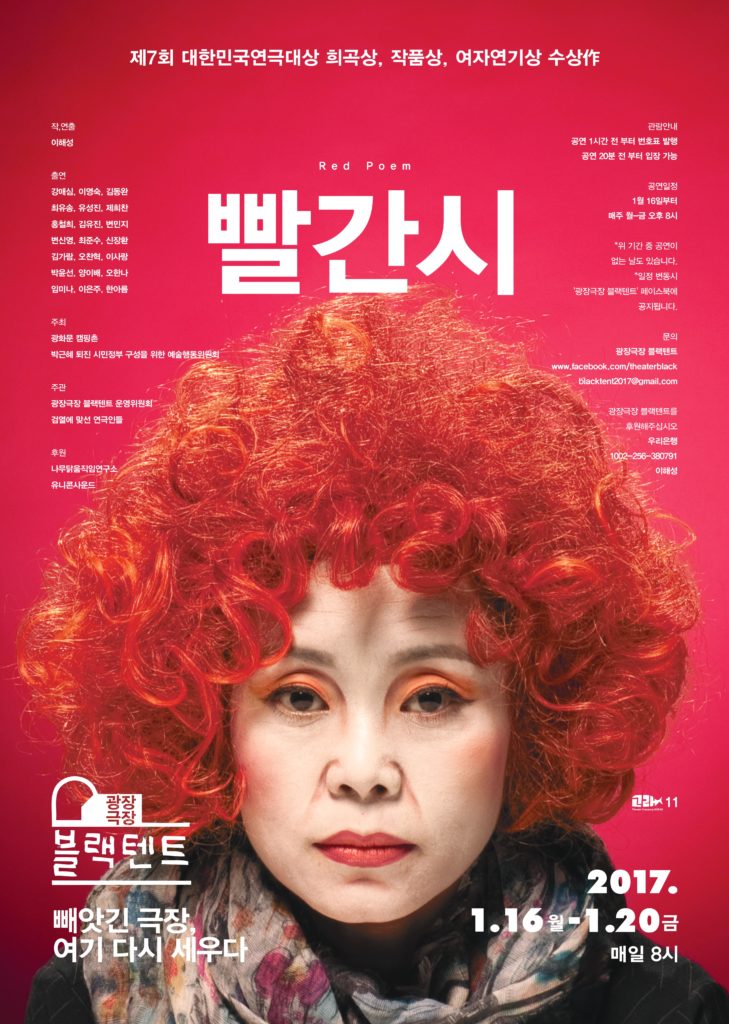
Poster for Black Tent project run of Red Poem (courtesy of Theater Company Gorae)
This post was written by the author in their personal capacity.The opinions expressed in this article are the author’s own and do not reflect the view of The Theatre Times, their staff or collaborators.
This post was written by Kee-Yoon Nahm.
The views expressed here belong to the author and do not necessarily reflect our views and opinions.

